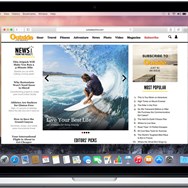About Safari
Safari is the default web browser for all Apple devices, offering a streamlined and efficient way to explore the internet. Built on the powerful WebKit engine, Safari is designed to be fast and consume less power, extending battery life on laptops and mobile devices. Its deep integration with the Apple ecosystem allows for seamless syncing of bookmarks, history, and passwords via iCloud, providing a consistent browsing experience across your Mac, iPhone, and iPad.
Safari places a strong emphasis on user privacy and security. It includes features like Intelligent Tracking Prevention, which helps block trackers from following your activity across websites. The browser also offers built-in protections against malicious websites and phishing attempts. Content blockers can be enabled to customize your browsing experience and potentially speed up page loading by blocking unwanted ads and pop-ups.
The user interface of Safari is clean and intuitive, designed to keep the focus on the content you're viewing. Features like Tabbed Browsing and Tab Groups help you manage multiple open websites efficiently. Picture-in-Picture mode allows you to watch videos while browsing other pages. For developers, Safari includes a comprehensive set of Developer Tools for inspecting and debugging web pages.
While primarily designed for the Apple ecosystem, Safari provides a robust and reliable browsing experience with a focus on performance, energy efficiency, and user privacy.
Expert Review
Safari Browser Review
Safari, developed by Apple, serves as the default web browser across the macOS and iOS ecosystems. Its design philosophy centers around integrating tightly with Apple's hardware and software, prioritizing performance, energy efficiency, and user privacy.
At its core, Safari is powered by the WebKit rendering engine. This engine is renowned for its adherence to web standards and its speed, contributing significantly to Safari's reputation as a fast browser. Benchmarks often place Safari competitively against other major browsers in terms of loading times and JavaScript execution.
One of Safari's most emphasized aspects is its commitment to user privacy. The browser includes a robust feature called Intelligent Tracking Prevention (ITP). ITP utilizes machine learning to identify and limit the ability of advertisers and websites to track users across different sites. This is a significant differentiator and appeals strongly to users concerned about their online footprint. Furthermore, Safari provides clear privacy reports, giving users insight into the trackers that have been blocked on the websites they visit.
The browser's integration with the Apple ecosystem is a major selling point for users already invested in Apple products. Features like iCloud Keychain securely store and synchronize passwords across macOS and iOS devices. Handoff allows users to seamlessly transfer their active browsing session from an iPhone or iPad to a Mac, or vice versa. These features create a fluid and connected experience for Apple users.
Safari's user interface is clean and minimalist, focusing on the content rather than browser chrome. Tabbed browsing is standard, and the implementation is intuitive. The introduction of Tab Groups in recent versions has further enhanced the ability to organize multiple opened tabs, which can be particularly useful for research or project-based browsing.
Performance on Apple hardware is where Safari truly shines. It is optimized to leverage the specific capabilities of Apple silicon processors, resulting in excellent energy efficiency. This translates to longer battery life for MacBook users and less strain on resources for iPhone and iPad users. This performance optimization is a key advantage over third-party browsers on Apple devices.
Safari also supports extensions, allowing users to customize their browsing experience with additional features. While the extension ecosystem may not be as extensive as that of browsers like Chrome or Firefox, a growing number of popular extensions are available.
For developers, Safari includes a capable set of Developer Tools. These tools provide the necessary features for inspecting HTML, CSS, and JavaScript, debugging code, and analyzing network activity. While some developers might prefer the toolsets available in other browsers, Safari's developer tools are more than sufficient for most web development tasks.
On the downside, Safari's strong ties to the Apple ecosystem mean it is not available on Windows or Android, limiting its appeal for users who use a mix of operating systems. While its privacy features are strong, some power users might find the customization options less granular compared to browsers like Firefox or Brave.
Overall, Safari is a highly competent and polished web browser, particularly for users within the Apple ecosystem. Its focus on speed, energy efficiency, and privacy, combined with seamless integration across devices, makes it an excellent choice for many. While its lack of cross-platform support and a smaller extension library might deter some, its core strengths provide a compelling browsing experience for its target audience.
Key Areas:
* **Performance:** Excellent, especially on Apple hardware, with a focus on speed and energy efficiency.
* **Privacy:** Strong emphasis with features like Intelligent Tracking Prevention and privacy reports.
* **Ecosystem Integration:** Deeply integrated with macOS and iOS, offering seamless syncing and Handoff.
* **User Interface:** Clean, minimalist, and intuitive.
* **Extensions:** Growing but not as extensive as some competitors.
* **Developer Tools:** Capable and functional for web development.
Conclusion: For Apple users, Safari is a highly recommended browser that delivers a fast, private, and energy-efficient browsing experience.















